New & Noteworthy
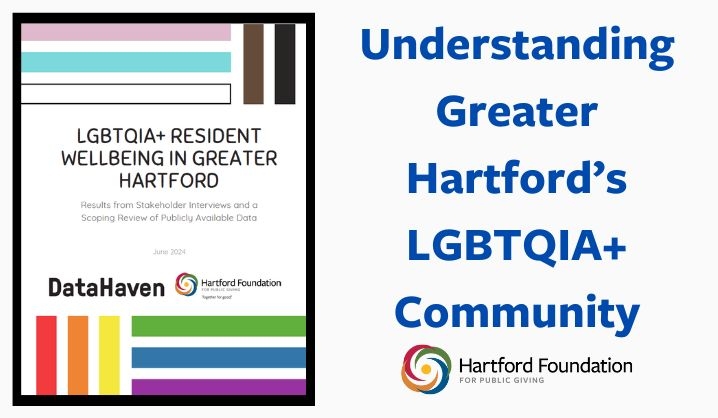
New Report Highlights Opportunities and Challenges for Greater Hartford’s LGBTQIA+ Community
Report finds lack of adequate collection of data on sexual orientation and gender identity negatively affects ability to deliver services
In April 2024, a group of nonprofit leaders, activists and other community members from Greater Hartford’s lesbian, gay, bisexual, transgender, queer, intersex, and asexual or aromantic and other sexual and gender minority community members (LGTBQIA+) participated in a convening hosted by the Hartford Foundation for Public Giving to learn about and discuss a new study about key quality of life issues in the community. The Foundation partnered with DataHaven who authored the report, “LGBTQIA+ Resident Wellbeing in Greater Hartford” and presented findings to those in attendance. Following the presentation, participants engaged in discussion on how the data resonated with their own life experiences as part of an effort to craft solutions to critical issues facing this diverse community.
This collaboration between DataHaven and the Hartford Foundation was intended to illuminate the current state of the LGBTQIA+ community’s quality of life in the Greater Hartford area. Findings provided in this first-of-its-kind report were designed to assist organizations and funders in understanding conditions that affect LGBTQIA+ individuals’ health and wellbeing to better direct resources to meet the needs of this growing community. One of the central features of the study was to provide disaggregated data to further explore LGBTQIA+ residents’ lives at the intersection of other identities including age, disability, race, and ethnicity.
“The combination of qualitative and quantitative data in this report highlights a rich story of a resilient and passionate community of LGBTQIA+ people and resources in Greater Hartford,” said Shannon Carter, a DataHaven Research Associate and lead author of the study. “As indicated by the data, this community has unique barriers to housing, healthcare, and employment due to structural stigma and interpersonal bias. This is evident in the disparities in outcomes on these measures.”
The quantitative data used in the study was mostly obtained from the Census Bureau’s Household Pulse Survey, DataHaven’s Community Wellbeing Survey (DCWS), and the Connecticut Commission on Human Rights and Opportunities’ yearly discrimination data. The report demonstrates that there are striking disparities between LGBTQIA+ and non-LGBTQIA+ residents in terms of food insufficiency, housing stability, financial security, health outcomes and difficulty accessing healthcare. Qualitative interviews with people working at LGBTQIA+ serving organizations echoed these different outcomes and pointed toward inequities including discrimination or systemic marginalization as drivers of these disparities.
As part of the study, DataHaven reviewed datasets found that sexual orientation/gender identity data are often not collected in major government and private datasets – particularly information about transgender and two-spirit people. The report raises the need for ongoing and improved data collection that will allow for a better understanding of this community's needs.
At a more local level, DataHaven found that LGBTQIA+-serving organizations in Greater Hartford have a complex relationship with collecting data about LGBTQIA+ residents. While nonprofit interviewees saw the value of collecting actionable data for policy, practice, and fundraising reasons, they had to balance this need with protecting the safety and privacy of program participants. Lack of trust in how other institutions would use and safeguard these sensitive data was noted as a barrier to collection.
Among the key findings from the quantitative portion of the report include:
Data Availability
Sexual Orientation/Gender Identity data are often not collected in major government and private datasets. Less than half collect any data on sexual orientation or gender identity.
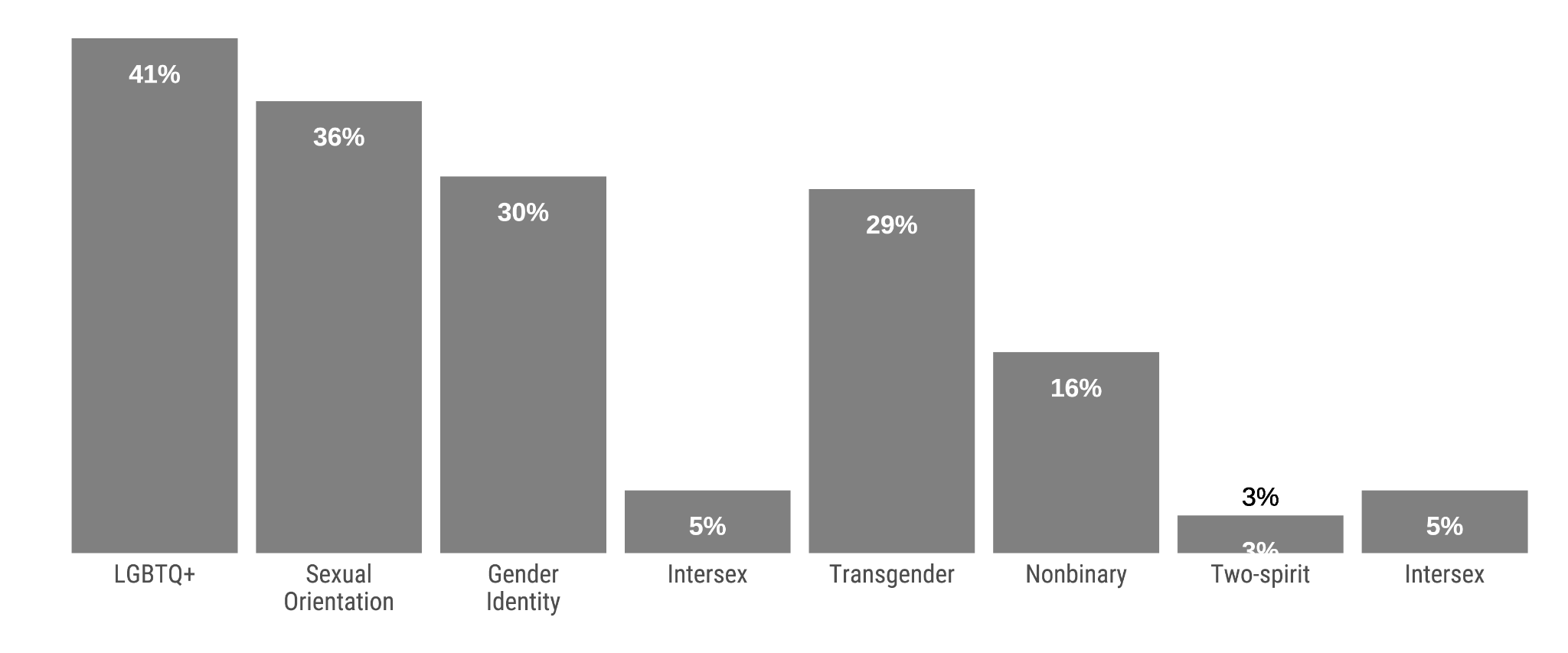
Discrimination
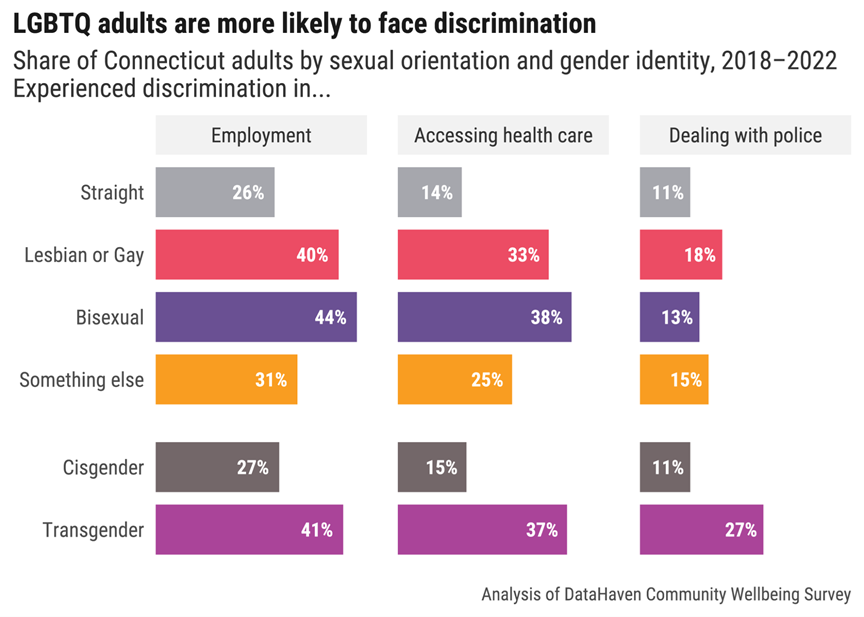
Financial Security
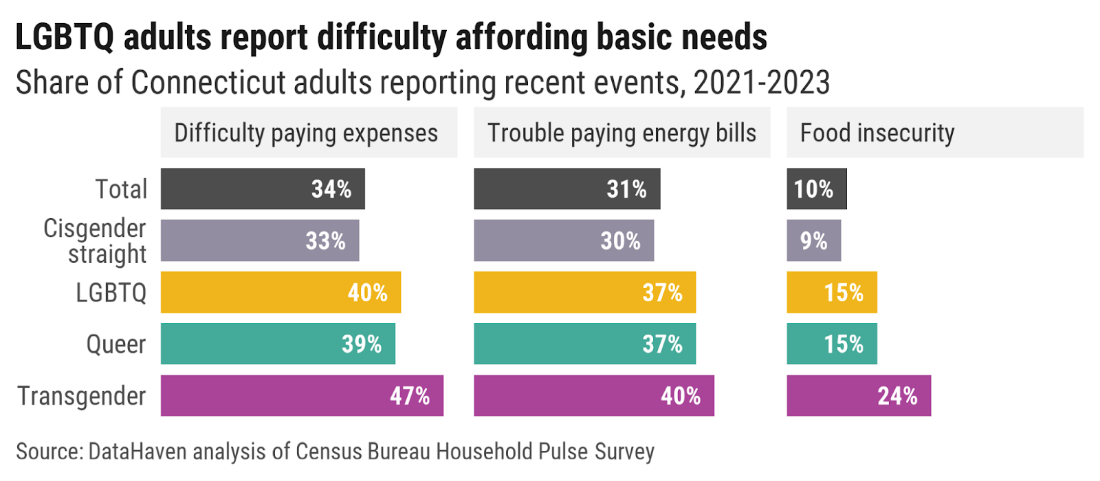
Health and Healthcare
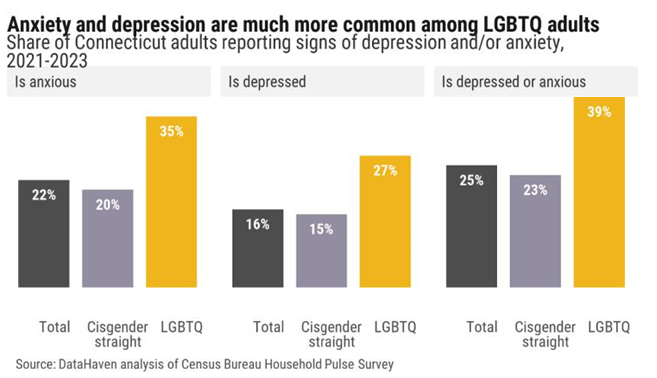
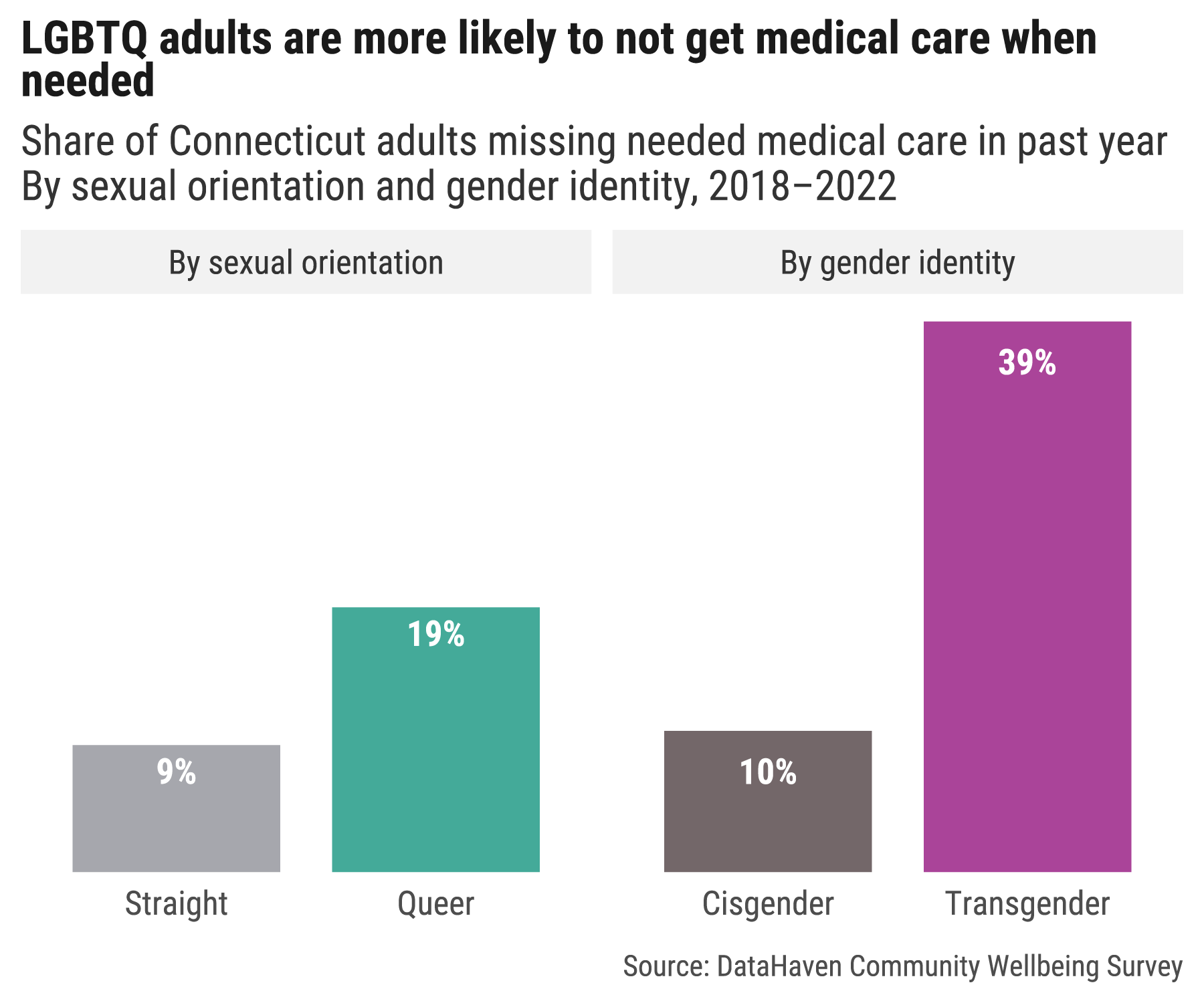
In addition to an analysis of existing quantitative data, the report also included qualitative data collected through interviews with leaders at LGBTQIA+-serving organizations. They were asked about their work, their relationship with data, the strengths and needs of LGBTQIA+ community, and priorities for their work. Interviewees shared that serving the whole person, at all intersections of their identity, is a key focus of organizations that work with LGBTQIA+ people in Greater Hartford.
Many priorities aligned with disparities shown in the quantitative findings were also highlighted in the qualitative data. Among the key areas these organizations were focused on were:
- Providing access to affordable, safe, and accessible housing.
- Responding to high levels of homelessness and lack of sufficient access to appropriate shelter.
- Ensuring access to gender affirming care.
- Preventing discriminatory treatment of trans and gender nonconforming people in medical and mental health settings.
Interviewees were also asked about assets in the LGBTQIA+ community. They responded with a variety of strengths including resilience, humor, a willingness to care for each other in the community, politically educated LGBTQIA+ residents, a focus on intersectionality among LGBTQIA+ organizations and residents, the ongoing creation of LGBTQIA+ spaces, and joy.
The findings shared in this report will help to inform future investments by the Hartford Foundation including through its Equality Fund, which was created by the late Joel Roskin to support organizations serving Greater Hartford that empower individuals of diverse sexual orientations, gender identities and gender expressions to thrive. In 2022, the Foundation provided resources to the fund to support Greater Hartford’s LGBTQIA+ community in ways that extend beyond grantmaking by convening Greater Hartford residents to discuss critical issues and build partnerships. The April convening to share the finding of this report was supported by the Equality Fund.
“The Foundation is pleased to collaborate with DataHaven on this detailed report that compiles data on LGBTQIA+ experiences and quality of life that is specific to the region and Connecticut,” said Kate Szczerbacki, the Hartford Foundation’s Director of Learning, Evaluation, and Capacity Building. “By sharing these findings, which have never been gathered in a single report, with nonprofits, philanthropy, policymakers, and other key partners, we intend that it will inform future investments, programming, and public policy decisions to support the queer community in Greater Hartford and Connecticut.”
Serving Connecticut since 1992, DataHaven’s mission is to empower people to create thriving communities by collecting and ensuring access to data on well-being, equity, and quality of life. We have served Connecticut as a nonprofit organization since 1992, working with many partners to develop reports, tools, and technical assistance programs that make information more useful to local communities. throughout Connecticut.
The Hartford Foundation for Public Giving is the community foundation for Hartford and 28 surrounding towns. Through partnerships, the Foundation seeks to strengthen communities in Greater Hartford by putting philanthropy in action to dismantle structural racism and achieve equity in social and economic mobility. Made possible by the gifts of generous individuals, families and organizations, the Foundation has awarded grants of more than $998 million since its founding in 1925. For more information, visit www.hfpg.org or call 860-548-1888.
